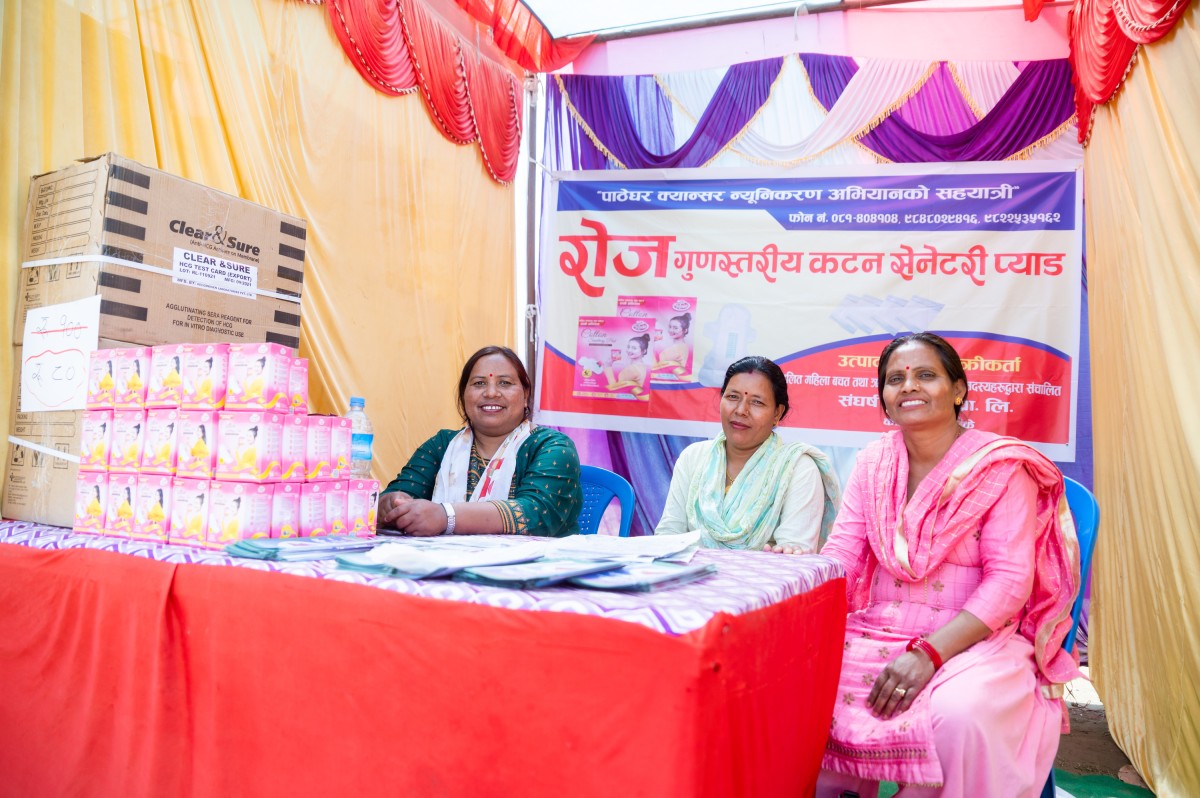How 28 Nepalese women pitched in and jumped headfirst into the menstrual pad business
28 women run a business in Nepal that sells sanitary pads and provides menstruation education in schools. Read the story of the Rose Sangharsha Group.
Two rooms, a kitchen and a storage space on the upper floor of a building in Kohalpur Municipality, Nepal: it seems hardly enough for the ambitions of the Rose Sangharsha Group and the women who work there.
Together they run a business that sells menstrual pads and provides awareness classes on menstruation in schools. Their president Tulsi Sunar jokes: ‘I want Rose Sangharsha to be mentioned in the same sentence as Nepalese billionaire Binod Chaudhary.’

From pitch to production problems
They all look at Gita Sunar when the inception of the Rose Sangharsha Group is brought up. It was Gita who became inspired when she learned about the Rose Foundation, an organisation willing to partner on producing and selling menstrual pads.
She was a member of the Sangharsha Dalit Mahila Saving and Credit Cooperative, an organisation with 2.600 members founded in 2007 to provide credit to especially Dalit women. With her newfound ambition, Gita presented the idea, and 28 members came together, pitched in their money and got a loan from the cooperative and Rose Sangharsha was born.
Tulsi, the dynamic president of the Rose Sangharsha Group, admits they jumped in headfirst without fully understanding the proper steps to set up a successful business. They were excited to get started and when the Rose Foundation asked if they wanted to only sell the products or do the whole process ranging from sourcing material and creating pads, they chose the latter, more ambitious option. They soon realized it was more than they bargained for, since getting the material proved to be difficult and the production of menstrual pads came to a halt.
‘Now, we can provide employment to people from our community. We can provide these pads for people to sell to the community, for people to show in their shop or for people to pack’
Gita Sunar
Learning the business skills
Enter Simavi partner Biruwa, who through the WASH SDG sub-programme in Nepal, breathed new life into the Rose Sangharsha Group. Together with Biruwa, the group started to ask the key questions to turn their business into a success. Gradually they became more familiar with market testing and checking their competition. They established their target group, namely public schools. To make sure girls can go to school during their menstruation, public schools are obligated to provide two boxes of pads per adolescent girl per month.
Tulsi proudly shows the pads they sell. They contain less plastic than their competitors, meaning they are more biodegradable and absorb more blood. They pack them per 6 or 8 pads and provide these to schools. They also give awareness classes on menstruation at every school they provide with pads. But Rose Sangharsha's impact is even more far-reaching. ‘Now, we can provide employment to people from our community. We can provide these pads for people to sell to the community, for people to show in their shop or for people to pack’, Gita explains.
Growing the business and growing in impact
They have many ideas for the future to increase their impact. Not only to grow as a company, but also by creating a fund for victims of uterine cancer out of their profits. Gita has become confident they can manage all the business aspects themselves. And managing the different needs and personalities of 28 members of the Group has really grown her soft skills as well.
For Tulsi it means she has fulfilled her life-long dream to become an entrepreneur. ‘I have gotten a lot of support from the members of the cooperative. And now I am a lot more confident in my abilities as a leader. Even if this fails - which is not going to happen - I feel confident we can set up something new.’
Want to learn more about WASH SDG or our programmes? Visit our programme page.

